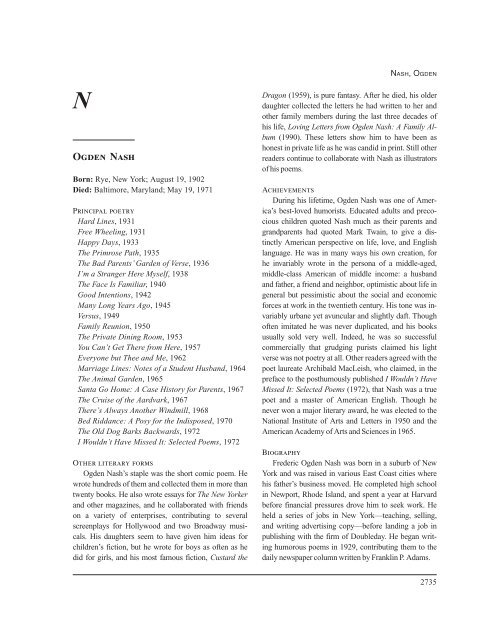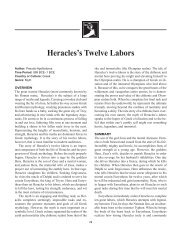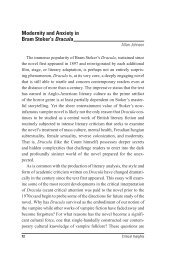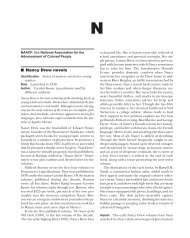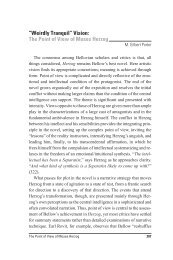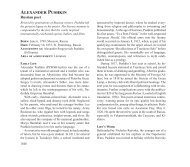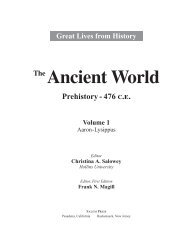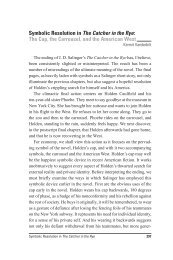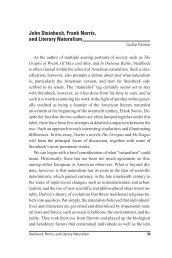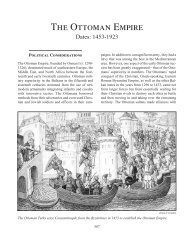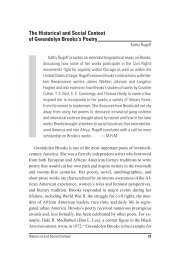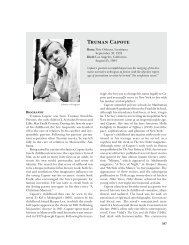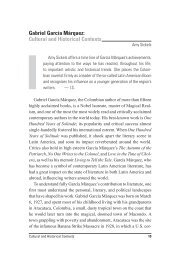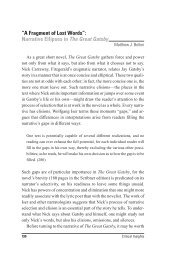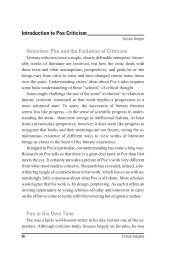You also want an ePaper? Increase the reach of your titles
YUMPU automatically turns print PDFs into web optimized ePapers that Google loves.
N<br />
<strong>Ogden</strong> <strong>Nash</strong><br />
<strong>Nash</strong>, <strong>Ogden</strong><br />
Born: Rye, New York; August 19, 1902<br />
Died: Baltimore, Maryland; May 19, 1971<br />
Principal poetry<br />
Hard Lines, 1931<br />
Free Wheeling, 1931<br />
Happy Days, 1933<br />
The Primrose Path, 1935<br />
The Bad Parents’ Garden of Verse, 1936<br />
I’m a Stranger Here Myself, 1938<br />
The Face Is Familiar, 1940<br />
Good Intentions, 1942<br />
Many Long Years Ago, 1945<br />
Versus, 1949<br />
Family Reunion, 1950<br />
The Private Dining Room, 1953<br />
You Can’t Get There from Here, 1957<br />
Everyone but Thee and Me, 1962<br />
Marriage Lines: Notes of a Student Husband, 1964<br />
The Animal Garden, 1965<br />
Santa Go Home: A Case History for Parents, 1967<br />
The Cruise of the Aardvark, 1967<br />
There’s Always Another Windmill, 1968<br />
Bed Riddance: A Posy for the Indisposed, 1970<br />
The Old Dog Barks Backwards, 1972<br />
I Wouldn’t Have Missed It: Selected Poems, 1972<br />
Other literary forms<br />
<strong>Ogden</strong> <strong>Nash</strong>’s staple was the short comic poem. He<br />
wrote hundreds of them and collected them in more than<br />
twenty books. He also wrote essays for The New Yorker<br />
and other magazines, and he collaborated with friends<br />
on a variety of enterprises, contributing to several<br />
screenplays for Hollywood and two Broadway musicals.<br />
His daughters seem to have given him ideas for<br />
children’s fiction, but he wrote for boys as often as he<br />
did for girls, and his most famous fiction, Custard the<br />
<strong>Nash</strong>, <strong>Ogden</strong><br />
Dragon (1959), is pure fantasy. After he died, his older<br />
daughter collected the letters he had written to her and<br />
other family members during the last three decades of<br />
his life, Loving Letters from <strong>Ogden</strong> <strong>Nash</strong>: A Family Album<br />
(1990). These letters show him to have been as<br />
honest in private life as he was candid in print. Still other<br />
readers continue to collaborate with <strong>Nash</strong> as illustrators<br />
of his poems.<br />
Achievements<br />
During his lifetime, <strong>Ogden</strong> <strong>Nash</strong> was one of America’s<br />
best-loved humorists. Educated adults and precocious<br />
children quoted <strong>Nash</strong> much as their parents and<br />
grandparents had quoted Mark Twain, to give a distinctly<br />
American perspective on life, love, and English<br />
language. He was in many ways his own creation, for<br />
he invariably wrote in the persona of a middle-aged,<br />
middle-class American of middle income: a husband<br />
and father, a friend and neighbor, optimistic about life in<br />
general but pessimistic about the social and economic<br />
forces at work in the twentieth century. His tone was invariably<br />
urbane yet avuncular and slightly daft. Though<br />
often imitated he was never duplicated, and his books<br />
usually sold very well. Indeed, he was so successful<br />
commercially that grudging purists claimed his light<br />
verse was not poetry at all. Other readers agreed with the<br />
poet laureate Archibald MacLeish, who claimed, in the<br />
preface to the posthumously published I Wouldn’t Have<br />
Missed It: Selected Poems (1972), that <strong>Nash</strong> was a true<br />
poet and a master of American English. Though he<br />
never won a major literary award, he was elected to the<br />
National Institute of Arts and Letters in 1950 and the<br />
American Academy of Arts and Sciences in 1965.<br />
Biography<br />
Frederic <strong>Ogden</strong> <strong>Nash</strong> was born in a suburb of New<br />
York and was raised in various East Coast cities where<br />
his father’s business moved. He completed high school<br />
in Newport, Rhode Island, and spent a year at Harvard<br />
before financial pressures drove him to seek work. He<br />
held a series of jobs in New York—teaching, selling,<br />
and writing advertising copy—before landing a job in<br />
publishing with the firm of Doubleday. He began writing<br />
humorous poems in 1929, contributing them to the<br />
daily newspaper column written by Franklin P. Adams.<br />
2735


